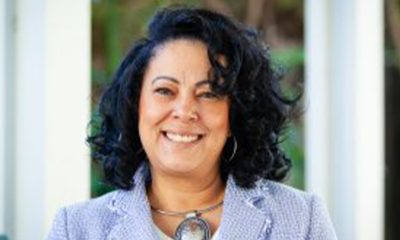Business
Closing Education Gap Would Boost U.S. Economy

Attorney General Loretta Lynch speaking at NAACP convention in Philadelphia
(Photo by Abdul Sulayman/Philadelphia Tribune)
By Freddie Allen
NNPA Senior Washington Correspondent
WASHINGTON (NNPA) – Men of color would earn $170 billion more a year, if they reached the same education level as White men, according to a new White House report.
The report examined “opportunity gaps facing youth of color” and found stunning correlations between the educational and employment success of young men of color and how that success can directly impact the national economy.
Not only would closing the education attainment gap result in higher annual earnings for men of color 25-64 years-old, it would also increase the gross domestic product, the value of the production of goods and services, by 1.8 percent in the United States. The Bureau of Economic Analysis reported that GDP decreased by an annual rate of 0.2 percent in the first quarter of 2015.
The high school graduation rate for Black students is 17 percentage points lower than their White classmates and only “28 percent of Blacks have a college degree by their late 20s, compared to nearly half of White men,” the report said.
The report said that youth of color encounter a number of barriers to opportunity at higher rates compared to their White peers.
“For example, while 20 percent of all children under age 18 live in poverty, 38 percent of Black children and 30 percent of Hispanic children live in poverty, compared to 11 percent of non-Hispanic White children,” stated the report.
Poor students often don’t have access to early childhood education, increasing the likelihood that they will start school at considerable disadvantage to their more affluent peers. When young students fall behind in their reading skills, it makes it harder for them to catch up to their peers in later grades and increases the chances that they will drop out.
When young Black men disconnect from school, they are more likely to connect to the criminal justice system at considerable expense to the rest of society.
“The cost of incarceration is far substantially higher than investing in education or other programs to increase opportunity, even before one takes the returns to the investments into account,” the report said. “The cost of incarceration for a single juvenile is over $100,000 – twice as high as tuition at the most expensive college in the country or a year of intensive mentoring.”
And even though crime is down in recent years, spending on corrections at the federal, state and local level is $80 billion, according to President Obama.
A history poverty, lack of access to early childhood education and early interaction with the criminal justice system can follow a young Black man deep into adulthood and contribute to an early death or a lifetime of missed employment opportunities and lower rates of employment compared to White men.
“Even when there is little difference in the likelihood of committing a crime, individuals of color are much more likely to be arrested,” stated the report. “For example, a black individual is nearly four times as likely as a white individual to be arrested for marijuana possession, even though black and white individuals reported using marijuana at similar rates in 2010.”
The report continued: “In 1984, the majority of State and Federal prisoners were White. In 2011, the majority of the more than 1.5 million prisoners were minorities, including 930,000 prisoners who were Black or Hispanic (61 percent).”
“Among adults 16 and older, Black men are nearly 15 percentage points less likely to be employed than White men,” stated the report.
And because the labor force participation rate only tracks people who are either employed or looking for work, more than 1 million Black men languishing in American prisons remain unaccounted for in the labor market artificially narrowing the employment chasm between Blacks and Whites until they return home.
“The relationship between economic opportunity and crime is not wholly clear-cut. For instance, crime fell throughout the most recent recession. Nevertheless, experience of past decades suggests that improving economic opportunity can also help lower crime rates,” the report said.
The report noted that the Chicago-based Becoming a Man (BAM) program has achieved success at steering disadvantaged young men away from the criminal justice system by taking a different approach
Rather than offering targeted job opportunities, the report said that BAM, which primarily serves young Black and Latino men, teaches their members how to make better decisions “in high-stress situations through in-school sessions focused on making participants more aware of their automatic responses and on thinking about the appropriate response to the situation at hand.”
BAM not only reduced violent crime arrests among program participants from 2009-2010, the young men also got better grades. An evaluation of the program during the 2013-2014 school year showed a 31 percent decline in the likelihood of arrests for BAM members.
The White House report said that scholarships and one-on-one coaching can also help low-income students graduate from college.
The high costs of mass incarceration, coupled with the increased awareness about the militarization of local police forces and the controversial practices of the for-profit prison industry have driven lawmakers to reconsider tough on crime policies in favor of smarter sentencing guideline, restorative justice and community-based rehabilitation programs.
During her keynote address at the NAACP’s annual convention in Philadelphia, United States Attorney General Loretta Lynch noted the launch of the Smart on Crime initiative and it’s impact on mandatory minimum sentencing and investments in rehabilitation and reentry programs.
“The early results of these efforts have been extremely promising,” said Lynch. “I am not just hopeful, but excited about where these reforms will lead us in the years to come.”
Making the criminal justice system more efficient, more effective and more fair on the federal level will require broader reform efforts bipartisan support in Congress, said Lynch, adding that those efforts have to involve repairing the relationship between young people and law enforcement.
“Ultimately, we need children to see possibilities for themselves beyond the cycle of criminality and incarceration that has too often become a tragic and familiar fact of life,” said Lynch. “America is a land of second chances – but it must also be a land where we give opportunities to young people who haven’t gotten a chance at all.”
Activism
Oakland Post: Week of December 24 – 30, 2025
The printed Weekly Edition of the Oakland Post: Week of – December 24 – 30, 2025

To enlarge your view of this issue, use the slider, magnifying glass icon or full page icon in the lower right corner of the browser window.
Activism
Lu Lu’s House is Not Just Toying Around with the Community
Wilson and Lambert will be partnering with Mayor Barbara Lee on a toy giveaway on Dec. 20. Young people, like Dremont Wilkes, age 15, will help give away toys and encourage young people to stay in school and out of trouble. Wilkes wants to go to college and become a specialist in financial aid. Sports agent Aaron Goodwin has committed to giving all eight young people from Lu Lu’s House a fully paid free ride to college, provided they keep a 3.0 grade point average and continue the program. Lu Lu’s House is not toying around.

Special to the Post
Lu Lu’s House is a 501c3 organization based in Oakland, founded by Mr. Zirl Wilson and Mr. Tracy Lambert, both previously incarcerated. After their release from jail, they wanted to change things for the better in the community — and wow, have they done that!
The duo developed housing for previously incarcerated people, calling it “Lu Lu’s House,” after Wilson’s wonderful wife. At a time when many young people were robbing, looting, and involved in shootings, Wilson and Lambert took it upon themselves to risk their lives to engage young gang members and teach them about nonviolence, safety, cleanliness, business, education, and the importance of health and longevity.
Lambert sold hats and T-shirts at the Eastmont Mall and was visited by his friend Wilson. At the mall, they witnessed gangs of young people running into the stores, stealing whatever they could get their hands on and then rushing out. Wilson tried to stop them after numerous robberies and finally called the police, who Wilson said, “did not respond.” Having been incarcerated previously, they realized that if the young people were allowed to continue to rob the stores, they could receive multiple criminal counts, which would take their case from misdemeanors to felonies, resulting in incarceration.

Lu Lu’s House traveled to Los Angeles and obtained more than 500 toys
for a Dec. 20 giveaway in partnership with Oakland Mayor Barbara
Lee. Courtesy Oakland Private Industry,
Wilson took it upon himself to follow the young people home and when he arrived at their subsidized homes, he realized the importance of trying to save the young people from violence, drug addiction, lack of self-worth, and incarceration — as well as their families from losing subsidized housing. Lambert and Wilson explained to the young men and women, ages 13-17, that there were positive options which might allow them to make money legally and stay out of jail. Wilson and Lambert decided to teach them how to wash cars and they opened a car wash in East Oakland. Oakland’s Initiative, “Keep the town clean,” involved the young people from Lu Lu’s House participating in more than eight cleanup sessions throughout Oakland. To assist with their infrastructure, Lu Lu’s House has partnered with Oakland’s Private Industry Council.
For the Christmas season, Lu Lu’s House and reformed young people (who were previously robbed) will continue to give back.
Lu Lu’s House traveled to Los Angeles and obtained more than 500 toys.
Wilson and Lambert will be partnering with Mayor Barbara Lee on a toy giveaway on Dec. 20. Young people, like Dremont Wilkes, age 15, will help give away toys and encourage young people to stay in school and out of trouble. Wilkes wants to go to college and become a specialist in financial aid. Sports agent Aaron Goodwin has committed to giving all eight young people from Lu Lu’s House a fully paid free ride to college, provided they keep a 3.0 grade point average and continue the program. Lu Lu’s House is not toying around.
Activism
Desmond Gumbs — Visionary Founder, Mentor, and Builder of Opportunity
Gumbs’ coaching and leadership journey spans from Bishop O’Dowd High School, Oakland High School, Stellar Prep High School. Over the decades, hundreds of his students have gone on to college, earning academic and athletic scholarships and developing life skills that extend well beyond sports.

Special to the Post
For more than 25 years, Desmond Gumbs has been a cornerstone of Bay Area education and athletics — not simply as a coach, but as a mentor, founder, and architect of opportunity. While recent media narratives have focused narrowly on challenges, they fail to capture the far more important truth: Gumbs’ life’s work has been dedicated to building pathways to college, character, and long-term success for hundreds of young people.
A Career Defined by Impact
Gumbs’ coaching and leadership journey spans from Bishop O’Dowd High School, Oakland High School, Stellar Prep High School. Over the decades, hundreds of his students have gone on to college, earning academic and athletic scholarships and developing life skills that extend well beyond sports.
One of his most enduring contributions is his role as founder of Stellar Prep High School, a non-traditional, mission-driven institution created to serve students who needed additional structure, belief, and opportunity. Through Stellar Prep numerous students have advanced to college — many with scholarships — demonstrating Gumbs’ deep commitment to education as the foundation for athletic and personal success.

NCAA football history was made this year when Head Coach from
Mississippi Valley State, Terrell Buckley and Head Coach Desmond
Gumbs both had starting kickers that were women. This picture was
taken after the game.
A Personal Testament to the Mission: Addison Gumbs
Perhaps no example better reflects Desmond Gumbs’ philosophy than the journey of his son, Addison Gumbs. Addison became an Army All-American, one of the highest honors in high school football — and notably, the last Army All-Americans produced by the Bay Area, alongside Najee Harris.
Both young men went on to compete at the highest levels of college football — Addison Gumbs at the University of Oklahoma, and Najee Harris at the University of Alabama — representing the Bay Area on a national level.
Building Lincoln University Athletics From the Ground Up
In 2021, Gumbs accepted one of the most difficult challenges in college athletics: launching an entire athletics department at Lincoln University in Oakland from scratch. With no established infrastructure, limited facilities, and eventually the loss of key financial aid resources, he nonetheless built opportunities where none existed.
Under his leadership, Lincoln University introduced:
- Football
- Men’s and Women’s Basketball
- Men’s and Women’s Soccer
Operating as an independent program with no capital and no conference safety net, Gumbs was forced to innovate — finding ways to sustain teams, schedule competition, and keep student-athletes enrolled and progressing toward degrees. The work was never about comfort; it was about access.
Voices That Reflect His Impact
Desmond Gumbs’ philosophy has been consistently reflected in his own published words:
- “if you have an idea, you’re 75% there the remaining 25% is actually doing it.”
- “This generation doesn’t respect the title — they respect the person.”
- “Greatness is a habit, not a moment.”
Former players and community members have echoed similar sentiments in public commentary, crediting Gumbs with teaching them leadership, accountability, confidence, and belief in themselves — lessons that outlast any single season.
Context Matters More Than Headlines
Recent articles critical of Lincoln University athletics focus on logistical and financial hardships while ignoring the reality of building a new program with limited resources in one of the most expensive regions in the country. Such narratives are ultimately harmful and incomplete, failing to recognize the courage it takes to create opportunity instead of walking away when conditions are difficult.
The real story is not about early struggles — it is about vision, resilience, and service.
A Legacy That Endures
From founding Stellar PREP High School, to sending hundreds of students to college, to producing elite athletes like Addison Gumbs, to launching Lincoln University athletics, Desmond Gumbs’ legacy is one of belief in young people and relentless commitment to opportunity.
His work cannot be reduced to headlines or records. It lives on in degrees earned, scholarships secured, leaders developed, and futures changed — across the Bay Area and beyond.
-

 #NNPA BlackPress4 weeks ago
#NNPA BlackPress4 weeks agoLIHEAP Funds Released After Weeks of Delay as States and the District Rush to Protect Households from the Cold
-

 Activism4 weeks ago
Activism4 weeks agoOakland Post: Week of November 26 – December 2, 2025
-

 Alameda County3 weeks ago
Alameda County3 weeks agoSeth Curry Makes Impressive Debut with the Golden State Warriors
-

 #NNPA BlackPress4 weeks ago
#NNPA BlackPress4 weeks agoSeven Steps to Help Your Child Build Meaningful Connections
-

 #NNPA BlackPress4 weeks ago
#NNPA BlackPress4 weeks agoSeven Steps to Help Your Child Build Meaningful Connections
-

 #NNPA BlackPress4 weeks ago
#NNPA BlackPress4 weeks agoTrinidad and Tobago – Prime Minister Confirms U.S. Marines Working on Tobago Radar System
-

 #NNPA BlackPress4 weeks ago
#NNPA BlackPress4 weeks agoThanksgiving Celebrated Across the Tri-State
-

 #NNPA BlackPress4 weeks ago
#NNPA BlackPress4 weeks agoTeens Reject Today’s News as Trump Intensifies His Assault on the Press




















































